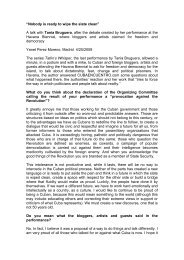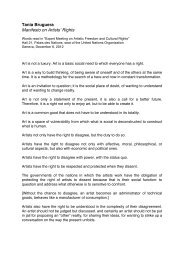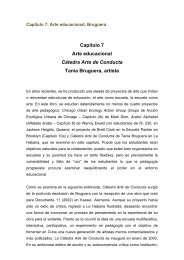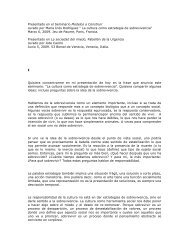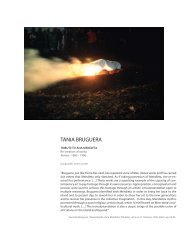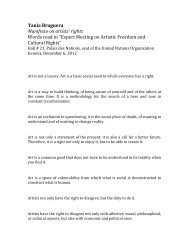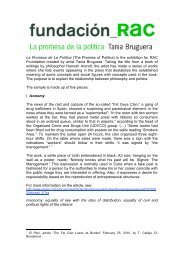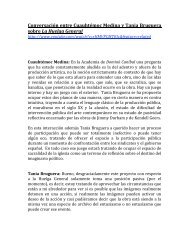Download PDF - Tania Bruguera
Download PDF - Tania Bruguera
Download PDF - Tania Bruguera
You also want an ePaper? Increase the reach of your titles
YUMPU automatically turns print PDFs into web optimized ePapers that Google loves.
38. Guevara, ‘Socialism and Man in Cuba’,<br />
p. 161.<br />
39. Figueroa, ‘Trajectories of Rumor: Cuban Art<br />
in the Postwar Period’, pp. 17–23.<br />
40. <strong>Bruguera</strong>, ‘<strong>Tania</strong> <strong>Bruguera</strong>: When Behavior<br />
Becomes Form’, Parachute, vol. 125, Winter<br />
2007, p. 70.<br />
41. <strong>Bruguera</strong>, ‘Ni todo, ni todos’, Memoria de la<br />
postguerra, vol. 1, no. 1, November 1993, p. 1.<br />
For the above-quoted translation, see Weiss, To<br />
and From Utopia, p. 232.<br />
42. Weiss, To and From Utopia, p. 232.<br />
43. <strong>Bruguera</strong>, interviewed by Roberta Tenconi.<br />
See ,http://www.taniabruguera.com/cms/<br />
247-0-Interview.htm. (accessed 10 April 2011).<br />
44. <strong>Bruguera</strong>, interviewed by Doloras Curia,<br />
,http://www.taniabruguera.com/cms/245-0-<br />
Ethics+of+provocation+<strong>Tania</strong>+<strong>Bruguera</strong>+<br />
turn+spectators+into+citizens.htm.<br />
(accessed 1 April 2011).<br />
45. <strong>Bruguera</strong>, ‘Arts, Havana’, Artforum, vol. 48,<br />
no. 10, Summer 2010, p. 299. (Emphasis in the<br />
original.)<br />
46. <strong>Bruguera</strong> singles out (Untitled) Rape Scene as<br />
the origin of Arte de conducta in her interview with<br />
Curia.<br />
47. <strong>Bruguera</strong>, conversation with the author,<br />
Queens, New York, 11 April 2011.<br />
<strong>Tania</strong> <strong>Bruguera</strong>: Between Histories<br />
media exactly as the party had – to re-perform the Revolution’s charge and<br />
rewrite history.<br />
Freedom of expression is compromised in Cuba. Yet, works like Memoria<br />
suggest that this is not simply because independent words and actions do not<br />
get published or circulate openly and in public. Freedom of expression is<br />
limited because in a mediatised revolution it is not possible to not be part of<br />
history. ‘To live in a country’, <strong>Bruguera</strong> explained,<br />
where every once in a while you hear a speech informing you that you are living a<br />
historical moment of which you are a part and in which you are expected to participate<br />
makes you have a rather daily relationship with what is historical. A relationship that is<br />
either of doubt and confusion ...or one that makes you monumentalize the slightest<br />
event in a kind of contest to have (to own) your share of historical responsibility. 43<br />
Calls for freedom, in other words, cannot take place against the revolution. They<br />
take place ‘within the revolution’. Like Memoria, they must acknowledge the fact<br />
that political subjects live inside the media and in between histories.<br />
In El susurro de Tatlin (Tatlin’s Whisper), a series of performances <strong>Bruguera</strong><br />
completed in 2009, she continued to explore the politics of collective action,<br />
inside and outside of Cuba. Site-specific, the work took six different<br />
incarnations, each related to the city in which it was staged. Tatlin’s Whisper<br />
#5 took place in 2008 at London’s Tate Modern (Fig. 7). Staged in the<br />
Turbine Hall, and without the artist, the work was performed by two<br />
mounted policemen. They were instructed by <strong>Bruguera</strong> to corral visitors –<br />
to do, in other words, what they do on the streets of London. Tatlin’s Whisper<br />
was part of an extended project, which <strong>Bruguera</strong> refers to as Arte de conducta or<br />
Behavior Art. A category designed to distinguish her practice from performance<br />
art – she calls her work performance acts – Arte de conducta refuses to consider<br />
the audience as spectators. 44 Instead, it approaches them as citizens. ‘I would<br />
like a museum in the not-so-new twenty-first century’, <strong>Bruguera</strong> explained,<br />
‘that abandons the idea of looking for the idea of activation ...one where art<br />
entails actual social transformation, instead of merely providing highly speculative<br />
strategies for bringing about such transformations.’ 45 This is political art,<br />
<strong>Bruguera</strong> argues, as opposed to art that uses images to create politics.<br />
Perhaps recalling Menéndez’s critique of looking in Reviva la Revolu,<br />
<strong>Bruguera</strong>’s desire to mark the difference between art that calls on the public<br />
to act politically and art that represents politics to the public finds its origins<br />
in Mendieta’s earliest performances. A case in point is Untitled (Rape Scene),<br />
which Mendieta performed in her home in Iowa in 1973 (Fig. 8). 46<br />
Prompted by the rape of a student on the University of Iowa campus where<br />
Mendieta was studying, Mendieta staged the aftermath of a rape and invited<br />
students to the event. When they arrived at her apartment, they found the<br />
door ajar and Mendieta, covered in blood, face down on a table. Rape Scene<br />
did not reproduce or represent the crime. Working from reports of the rape<br />
circulating in the local papers, the performance sought to activate the effect<br />
that the rape might have had on the public. Instead of representing the rape,<br />
Mendieta investigated the ways in which the media represents – controls and<br />
anesthetises – public response.<br />
<strong>Bruguera</strong> may just be one of Mendieta’s most astute critics. Admitting<br />
difficulty with Mendieta’s formalism, with her work’s literalisation of the<br />
female form and the island of Cuba, <strong>Bruguera</strong>’s Arte de conducta paid tribute<br />
to the one aspect of Mendieta’s work that scholars have tended to ignore:<br />
Mendieta’s investigation of the media. 47 Though sidelined by critical<br />
OXFORD ART JOURNAL 35.2 2012 225



